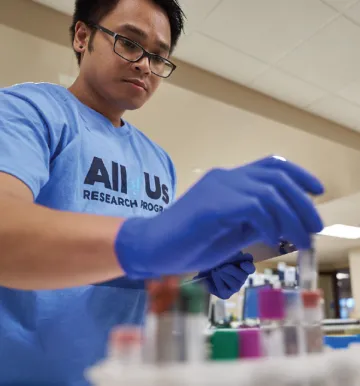
National Institutes of Health (NIH)
Funded by a six-year, $72 million grant from the National Institutes of Health (NIH), University of
Arizona scientists are bringing advanced computing to a colossal new dataset to expand what we know about how biology, environment and behavior influence health.
The NIH All of Us Research Program had provided data on more than 409,000 participants as of spring 2023. Records include medical histories, survey responses about family and lifestyle, census information and a trove of genetic data, including whole genome sequences for more than 245,000 individuals.
Just one whole genome contains about 3 billion base pairs of DNA. “We’re then overlaying data on
ancestry, environmental factors, social determinants of health,” said Jason Karnes, director of scientific programs for All of Us UArizona-Banner. “The dimensionality of the data is outstripping human cognitive capacity, so we’re working on several projects using machine learning to look at combinatorial effects.”
Initial data is already producing important insights, in part due to the unprecedented diversity of participants, Karnes said. In one study, topline analyses first replicated years of research showing strong associations between disease and self-reported race/ethnicity. But when adjusted for social determinants of health such as socioeconomic status, race and ethnicity became less predictive.
There’s certainly much more work to be done,” Karnes said, “but preliminary results suggest that social determinants of health have much more of an impact on disease risk than do genetics, and that health disparities are driven by systemic inequities in terms of access to care and other sociocultural factors.”
